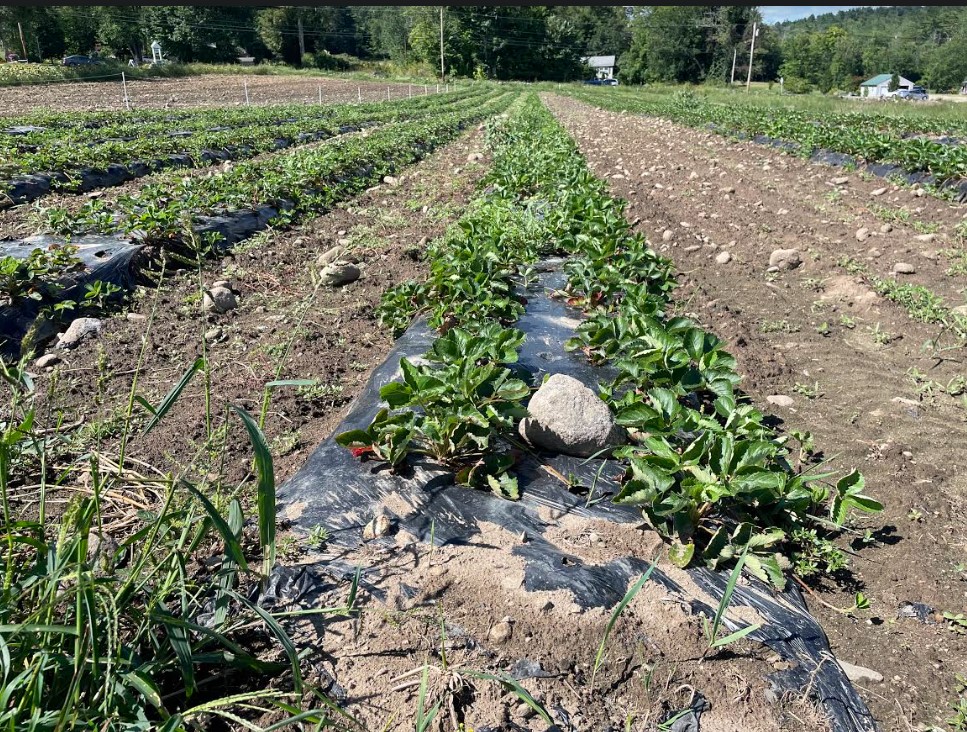By PAULA TRACY, InDepthNH.org
CONCORD – Climate change is having a direct impact on New Hampshire’s 4,000 small farms, particularly this past hot summer, but a new tool for them is coming in the recently signed into law Inflation Reduction Act of 2022.
Much of the media focus on this historic legislation has been on rebates for renewable home energy. But part of the $369 billion of the $750 billion bill for health care, climate and tax is to provide investment in renewables for farmers.
During a virtual press conference Wednesday, reporters learned that more than $20 billion in the act is earmarked to support renewable agricultural practices nationwide, such as those in New Hampshire which provide food, jobs, and agricultural tourism opportunities that are part of the state’s cultural and environmental fabric.
For some farmers like Jane Presby of Concord, that could mean future solar panels and a new well to support her Diamond Hill Farm and its farm stand which has been forced to make changes from the early days when she used heavy equipment to till her soil.
Help can’t come soon enough, she said, with some farmers just trying daily to keep up with changing climate and are thinking, frankly of quitting.
Presby told environmental leaders and representatives from three members of the state’s Congressional delegation that this season, farmers here lost about 30 percent of their crop due to the drought, cooler than normal spring, and other abnormal weather events which are all tied to a changing planet.
Presby said she is concerned for future generations of farmers and the costs associated with keeping up with such change.
While welcoming federal assistance, Presby said she worried that most of the money from this act would be bogged down in bureaucracy and hard to access for the typical small New Hampshire farmer or for those who might want to enter farming at all.
This act could be different from past big agricultural bills, she was told, and that perhaps New Hampshire could be used as a model for how this money could be used on small farms to make a major impact on everything from nutrition to agricultural tourism.
Colleen Stewart of the New Hampshire Food Alliance said she feels her organization can be “that middleman” who can help connect farmers with the grants over the next decade.
She noted the group plans a series of monthly networking cafes and educational opportunities which focus on six ways to build a climate-resilient food system in the state.
Julie Davenson, president of the Northeast Organic Farming Association of New Hampshire, noted the act was atypical of past farm relief measures which have not targeted the small-scale farmer of New Hampshire.
“We need to rebuild our New England infrastructure and food systems,” she said, noting this region might become a “climate refuge” for others.
She said she was eager to learn more about the act and noted it could be an opportunity for New Hampshire to demonstrate how renewable strategies can work on a small scale.
Catherine Corkery, director of the Sierra Club’s New Hampshire chapter and one of the organizers of the press conference, said the warmer winter temperatures, the extreme rainfall events, the record high-heat days and short-term droughts in the summer months aren’t just inconveniences for our farmers.
She pointed to record 90-degree heat days this summer in Concord, including 13 days in August when the norm is about four days.
For a farmer with a crop, “these are threats to their very livelihoods. Even though the ink is not dry on the Inflation Reduction Act, it could be a ‘saving grace for New Hampshire’s farmers. The funding, the support, and the tools could be just what they need to help stop the climate crisis that’s threatening the New Hampshire way of life.”
The act nationally includes:
· $20 billion to help farmers implement and expand climate-smart agricultural practices.
· $14 billion for clean energy in rural communities, including support for domestic biofuel production and for rural electric cooperatives transitioning to clean energy.
· $3.1 billion to support economically distressed farmers, and an additional $2.2 billion to support farmers who have, historically, been excluded from federal farm loan programs.
Presby said one of the greatest concerns she has is water access. She has an artesian well and water is limited. While investing in wind and solar may seem great it is not affordable for the typical farmer starting out, unless they left the corporate world and have the cash to invest.
A White House report on what this act could mean for New Hampshire is here https://www.whitehouse.gov/wp-content/uploads/2022/08/New-Hampshire.pdf
A 2020 picture of New Hampshire Agriculture is here https://www.agriculture.nh.gov/publications-forms/documents/usda-nh-ag-profile.pdf
When he signed it into law Aug. 16, President Biden said the bill is far-reaching and will help many American families. It addresses climate change, health care, taxation, and the federal deficit through direct appropriations, new programs, modifications to existing programs, and changes to the tax code.
“We’re cutting deficit to fight inflation by having the wealthy and big corporations finally begin to pay part of their fair share,” Biden said. Big corporations will now pay a minimum 15 percent tax instead of us — five- — 55 of them got away with paying zero dollars in federal income tax on $40 billion in profit.”
He emphasized that no one earning less than $400,000 a year will pay more in federal taxes.
He also said it was the Democrats who sided with the American people and every Republican in Congress sided with special interests in this vote.
CNN reported that the bill didn’t include part of Biden’s original plan “including paid family and sick leave, universal pre-kindergarten, an extension of the enhanced child tax credit, as well as provisions to lower the cost of college.”
President Biden’s Aug. 16 speech can be read here: https://www.whitehouse.gov/briefing-room/speeches-remarks/2022/08/16/remarks-by-president-biden-at-signing-of-h-r-5376-the-inflation-reduction-act-of-2022/





